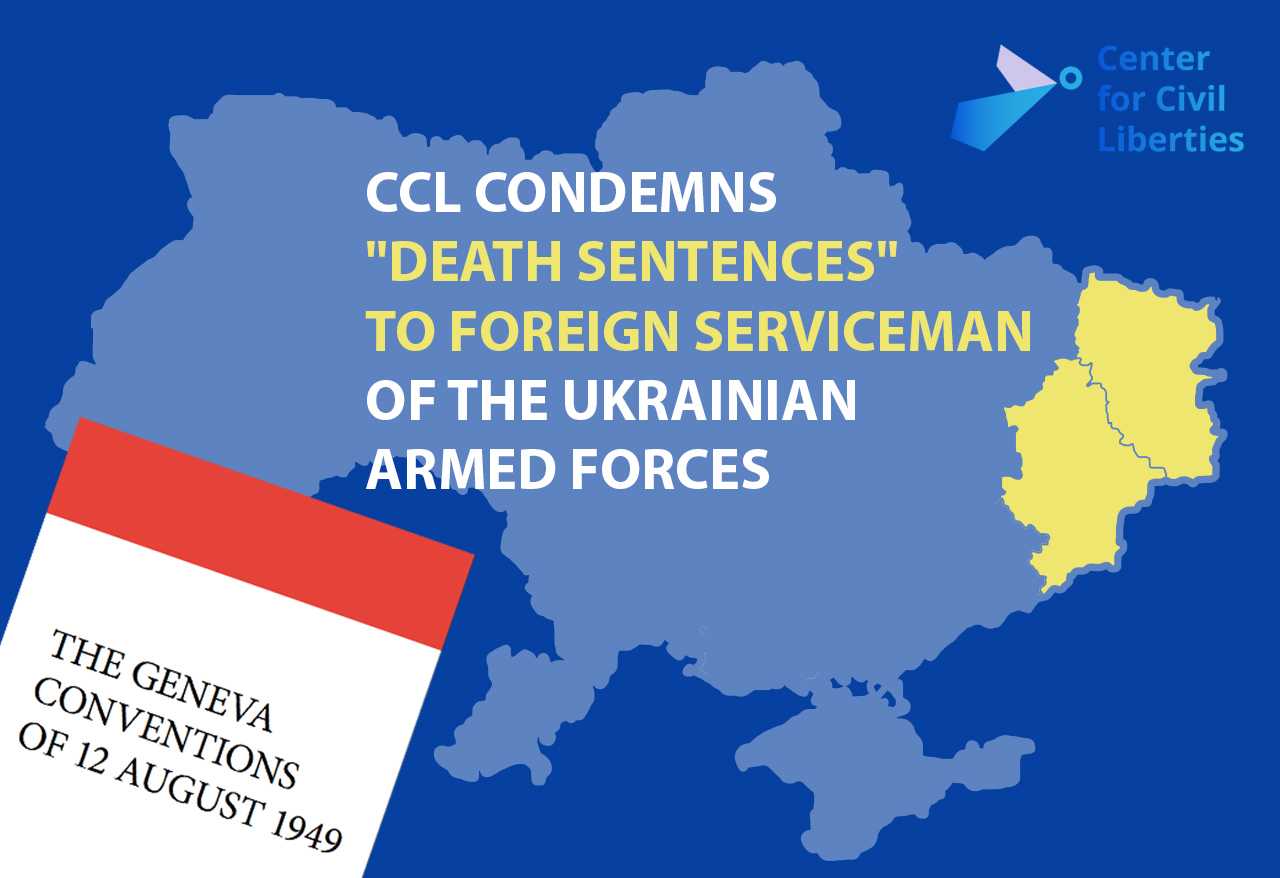CCL condemns «death sentences» to foreign servicemen of the Ukrainian Armed Forces

British citizens Aiden Aslin and Shaun Pinner together with Moroccan Saaudun Brahim were sentenced to death on 9 June 2022 for “mercenary activities” by the “court” of the so-called Donetsk People’s Republic.
Such a decision is not lawful under any circumstances. These trials of prisoners of war are classified as a war crime.
Correct application of the law is crucial for thousands of soldiers and non-combatants from both sides of barricades. For instance, the application of the Geneva Convention III, among others, defines guarantees and standards of imprisonment assigned to prisoners (Article 21 GCIII: ‘the Detaining Power may subject prisoners of war to internment).
Such issues as combatant status, use of deadly force, status-based targeting, humanitarian assistance, restrictions on weapons and methods of warfare are those significant implications of conflict classification.
From the start of the hostilities in Donbas in 2014 politicians and scholars debated the nature of the conflict and the degree of Russia’s involvement in it. Whether it is NIAC (non-international armed conflict) or IAC (international armed conflict). NIACs refer to situations where belligerency is purely a result of a domestic crisis. On the contrary, under international law, an IAC exists when states resort to armed force against each other. The treaty law provisions on international conflicts are more detailed than the ones on non-international conflicts.
We can clearly see “DPR” as a part of a Russian illegal invasion. Therefore, the Russian component plays a central, driven role in the conduct of hostilities. The intensity of the conflict and the casualties inflicted are therefore directly linked to Russian aggressive war, and illegal intervention.
Russian direct military involvement and overall control over separatist militant groups constitute an international armed conflict, with the application of the law of IACs to the hostilities.
In this particular case, three concepts of IHL are applicable to captured soldiers: lawful combatants, combatant privilege and POW status.
Lawful combatants. The mercenary claim is invalid because Ukraine has accepted them into UAF (Ukrainian Armed Forces) under lawful procedures. They were active-duty soldiers who must be protected by the Geneva conventions on prisoners of war.
Combatant privilege. As lawful combatants they have a combatant privilege, they have a right to participate in hostilities together with responsibilities and obligations, such as to respect IHL, to avoid inflicting extensive suffering, to distinguish between military and civilian objects, to not put civilians at risk ect.
Under the Geneva conventions, they should be treated as combatants. It is reasonable and lawful to treat soldiers in uniforms as soldiers. Meaning that prisoners of war are entitled for combatant immunities, to put it blankly they are “licensed to kill”. Soldiers can’t be prosecuted for executing lawful orders, or serving lawful military objectives during their participation in the hostilities.
POW status. As lawful combatants, entitled to combatant privilege, they deserve a proper treatment entitled to them by international law. While the internment of armed forces is a longstanding military practice, the trials are not.
What DPR did is completely out of the scope of the law. It violated the law of armed conflict. Under international law, Donetsk is a part of Ukraine. It is not a legitimate state. Even so, DPR is required to respect the fundamental principles of LOAC.
We believe that it is a Soviet-Nazi era show trial intended to imitate the war crimes trials of Russian soldiers taking place in Kyiv. Russia using its proxies to discourage foreigners from joining UAF. Such a “court” is a propaganda effort to justify the existence of DPR and to undermine the Ukrainian government.
Since 1997, Russia has imposed a moratorium on the death penalty. Therefore, this decision contradicts the Constitution of the Russian Federation, and the Russian Federation must stop the extrajudicial execution of soldiers of the Ukrainian Armed Forces, as this is a crime under both Russian law and international criminal law.
Both Ukraine and Russia are parties to the four 1949 Geneva Conventions and the 1977 Additional Protocol I, II. Furthermore, customary international humanitarian law applicable to IAC in the majority of provisions binds NIAC too. In addition, international human rights law continues to apply during times of both types of armed conflict.
Such handling of prisoners by Russia and its proxies is a grave violation of IHL.
Author: Roman Nekoliak, CCL project coordinator
Disclaimer: The views and opinions expressed in this article are those of the author and do not necessarily reflect the views or positions of the entities he represents.

